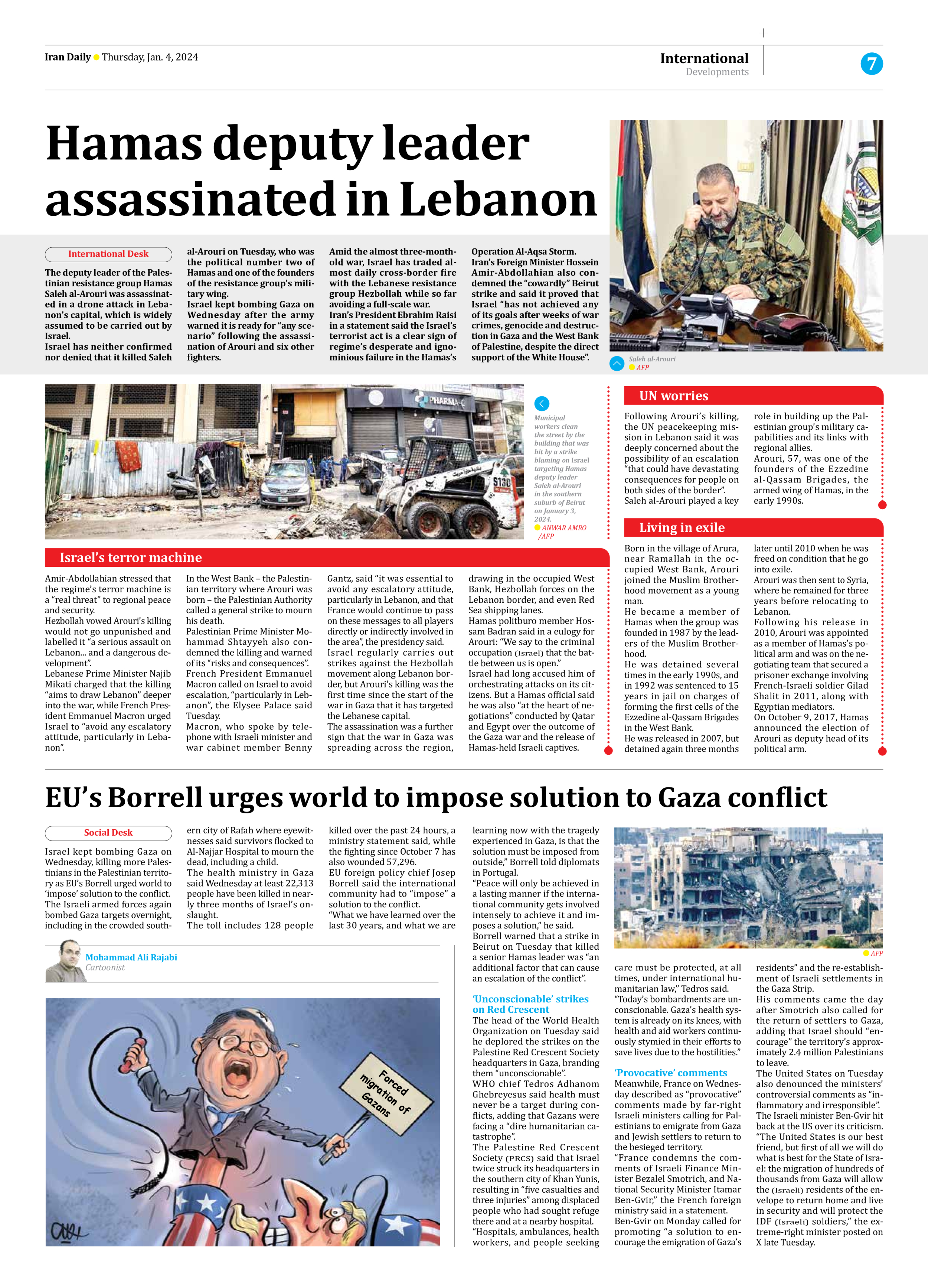
Hamas deputy leader assassinated in Lebanon
The deputy leader of the Palestinian resistance group Hamas Saleh al-Arouri was assassinated in a drone attack in Lebanon’s capital, which is widely assumed to be carried out by Israel.
Israel has neither confirmed nor denied that it killed Saleh al-Arouri on Tuesday, who was the political number two of Hamas and one of the founders of the resistance group’s military wing.
Israel kept bombing Gaza on Wednesday after the army warned it is ready for “any scenario” following the assassination of Arouri and six other fighters.
Amid the almost three-month-old war, Israel has traded almost daily cross-border fire with the Lebanese resistance group Hezbollah while so far avoiding a full-scale war.
Iran’s President Ebrahim Raisi in a statement said the Israel’s terrorist act is a clear sign of regime’s desperate and ignominious failure in the Hamas’s Operation Al-Aqsa Storm.
Iran’s Foreign Minister Hossein Amir-Abdollahian also condemned the “cowardly” Beirut strike and said it proved that Israel “has not achieved any of its goals after weeks of war crimes, genocide and destruction in Gaza and the West Bank of Palestine, despite the direct support of the White House”.
Israel’s terror machine
Amir-Abdollahian stressed that the regime’s terror machine is a “real threat” to regional peace and security.
Hezbollah vowed Arouri’s killing would not go unpunished and labelled it “a serious assault on Lebanon... and a dangerous development”.
Lebanese Prime Minister Najib Mikati charged that the killing “aims to draw Lebanon” deeper into the war, while French President Emmanuel Macron urged Israel to “avoid any escalatory attitude, particularly in Lebanon”.
In the West Bank – the Palestinian territory where Arouri was born – the Palestinian Authority called a general strike to mourn his death.
Palestinian Prime Minister Mohammad Shtayyeh also condemned the killing and warned of its “risks and consequences”.
French President Emmanuel Macron called on Israel to avoid escalation, “particularly in Lebanon”, the Elysee Palace said Tuesday.
Macron, who spoke by telephone with Israeli minister and war cabinet member Benny Gantz, said “it was essential to avoid any escalatory attitude, particularly in Lebanon, and that France would continue to pass on these messages to all players directly or indirectly involved in the area”, the presidency said.
Israel regularly carries out strikes against the Hezbollah movement along Lebanon border, but Arouri’s killing was the first time since the start of the war in Gaza that it has targeted the Lebanese capital.
The assassination was a further sign that the war in Gaza was spreading across the region, drawing in the occupied West Bank, Hezbollah forces on the Lebanon border, and even Red Sea shipping lanes.
Hamas politburo member Hossam Badran said in a eulogy for Arouri: “We say to the criminal occupation (Israel) that the battle between us is open.”
Israel had long accused him of orchestrating attacks on its citizens. But a Hamas official said he was also “at the heart of negotiations” conducted by Qatar and Egypt over the outcome of the Gaza war and the release of Hamas-held Israeli captives.
UN worries
Following Arouri’s killing, the UN peacekeeping mission in Lebanon said it was deeply concerned about the possibility of an escalation “that could have devastating consequences for people on both sides of the border”.
Saleh al-Arouri played a key role in building up the Palestinian group’s military capabilities and its links with regional allies.
Arouri, 57, was one of the founders of the Ezzedine al-Qassam Brigades, the armed wing of Hamas, in the early 1990s.
Living in exile
Born in the village of Arura, near Ramallah in the occupied West Bank, Arouri joined the Muslim Brotherhood movement as a young man.
He became a member of Hamas when the group was founded in 1987 by the leaders of the Muslim Brotherhood.
He was detained several times in the early 1990s, and in 1992 was sentenced to 15 years in jail on charges of forming the first cells of the Ezzedine al-Qassam Brigades in the West Bank.
He was released in 2007, but detained again three months later until 2010 when he was freed on condition that he go into exile.
Arouri was then sent to Syria, where he remained for three years before relocating to Lebanon.
Following his release in 2010, Arouri was appointed as a member of Hamas’s political arm and was on the negotiating team that secured a prisoner exchange involving French-Israeli soldier Gilad Shalit in 2011, along with Egyptian mediators.
On October 9, 2017, Hamas announced the election of Arouri as deputy head of its political arm.







